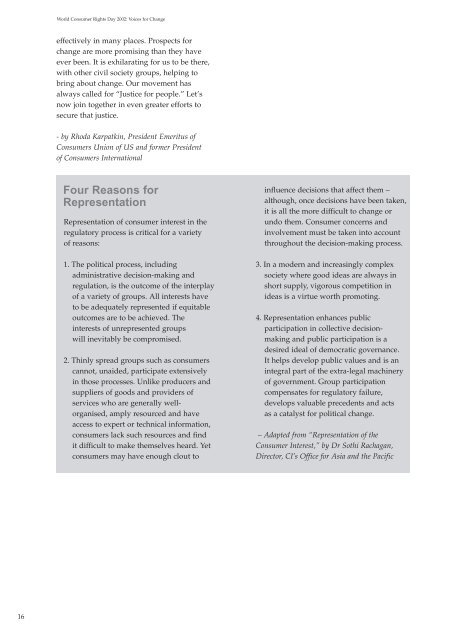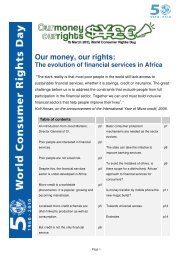Voices for Change: the Consumer Right to Representation
Voices for Change: the Consumer Right to Representation
Voices for Change: the Consumer Right to Representation
You also want an ePaper? Increase the reach of your titles
YUMPU automatically turns print PDFs into web optimized ePapers that Google loves.
16<br />
World <strong>Consumer</strong> <strong>Right</strong>s Day 2002: <strong>Voices</strong> <strong>for</strong> <strong>Change</strong><br />
effectively in many places. Prospects <strong>for</strong><br />
change are more promising than <strong>the</strong>y have<br />
ever been. It is exhilarating <strong>for</strong> us <strong>to</strong> be <strong>the</strong>re,<br />
with o<strong>the</strong>r civil society groups, helping <strong>to</strong><br />
bring about change. Our movement has<br />
always called <strong>for</strong> “Justice <strong>for</strong> people.” Let’s<br />
now join <strong>to</strong>ge<strong>the</strong>r in even greater ef<strong>for</strong>ts <strong>to</strong><br />
secure that justice.<br />
- by Rhoda Karpatkin, President Emeritus of<br />
<strong>Consumer</strong>s Union of US and <strong>for</strong>mer President<br />
of <strong>Consumer</strong>s International<br />
Four Reasons <strong>for</strong><br />
<strong>Representation</strong><br />
<strong>Representation</strong> of consumer interest in <strong>the</strong><br />
regula<strong>to</strong>ry process is critical <strong>for</strong> a variety<br />
of reasons:<br />
1. The political process, including<br />
administrative decision-making and<br />
regulation, is <strong>the</strong> outcome of <strong>the</strong> interplay<br />
of a variety of groups. All interests have<br />
<strong>to</strong> be adequately represented if equitable<br />
outcomes are <strong>to</strong> be achieved. The<br />
interests of unrepresented groups<br />
will inevitably be compromised.<br />
2. Thinly spread groups such as consumers<br />
cannot, unaided, participate extensively<br />
in those processes. Unlike producers and<br />
suppliers of goods and providers of<br />
services who are generally wellorganised,<br />
amply resourced and have<br />
access <strong>to</strong> expert or technical in<strong>for</strong>mation,<br />
consumers lack such resources and find<br />
it difficult <strong>to</strong> make <strong>the</strong>mselves heard. Yet<br />
consumers may have enough clout <strong>to</strong><br />
influence decisions that affect <strong>the</strong>m –<br />
although, once decisions have been taken,<br />
it is all <strong>the</strong> more difficult <strong>to</strong> change or<br />
undo <strong>the</strong>m. <strong>Consumer</strong> concerns and<br />
involvement must be taken in<strong>to</strong> account<br />
throughout <strong>the</strong> decision-making process.<br />
3. In a modern and increasingly complex<br />
society where good ideas are always in<br />
short supply, vigorous competition in<br />
ideas is a virtue worth promoting.<br />
4. <strong>Representation</strong> enhances public<br />
participation in collective decisionmaking<br />
and public participation is a<br />
desired ideal of democratic governance.<br />
It helps develop public values and is an<br />
integral part of <strong>the</strong> extra-legal machinery<br />
of government. Group participation<br />
compensates <strong>for</strong> regula<strong>to</strong>ry failure,<br />
develops valuable precedents and acts<br />
as a catalyst <strong>for</strong> political change.<br />
– Adapted from “<strong>Representation</strong> of <strong>the</strong><br />
<strong>Consumer</strong> Interest,” by Dr Sothi Rachagan,<br />
Direc<strong>to</strong>r, CI’s Office <strong>for</strong> Asia and <strong>the</strong> Pacific






![pkef]Qmf eg]sf] s] xf] < - Consumers International](https://img.yumpu.com/6479658/1/184x260/pkefqmf-egsf-s-xf-consumers-international.jpg?quality=85)
